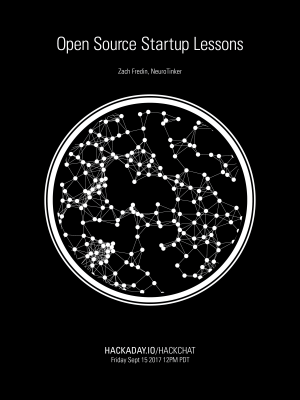If you want to found a company, you’ll find pages and pages of advice scattered around the Internet telling you exactly how to do that. What if you want to found an Open Source hardware company? That’s a bit harder — you can’t do hardware as a service, and that Open Source moniker will drive away investors.
 [Zach Fredin] is one of the rare founders that are making an Open Source hardware company work. In 2015, he developed NeuroBytes, a system of electric neurons designed in such a way that if you get two hundred or so, you can replicate the brain of a flatworm. NeuroBytes was a finalist in the 2015 Hackaday Prize, the team received an NHS grant, and now these PCB neurons will be on the market late this year.
[Zach Fredin] is one of the rare founders that are making an Open Source hardware company work. In 2015, he developed NeuroBytes, a system of electric neurons designed in such a way that if you get two hundred or so, you can replicate the brain of a flatworm. NeuroBytes was a finalist in the 2015 Hackaday Prize, the team received an NHS grant, and now these PCB neurons will be on the market late this year.
For this week’s Hack Chat, we’re going to be talking to [Zach] about the challenges about creating a company from nothing and doing it the Open Source way. Topics for this Friday’s Hack Chat will include the experience of building an Open Source hardware company, manufacturing, building a community around a product, and business spelled with dollar signs.
This Hack Chat will be Friday, noon, PDT. If you have a question for [Zach]. here’s a spreadsheet we’ll be drawing questions from.
Here’s How To Take Part:
 Our Hack Chats are live community events on the Hackaday.io Hack Chat group messaging. Hack Chats are usually at noon, Pacific time on Friday. This week is no exception and everything is going down noon, PDT, Friday, September 15th. Wondering when the Earth’s sun will be directly overhead the Hack Chat? Not a problem — here’s a handy, fancy countdown timer.
Our Hack Chats are live community events on the Hackaday.io Hack Chat group messaging. Hack Chats are usually at noon, Pacific time on Friday. This week is no exception and everything is going down noon, PDT, Friday, September 15th. Wondering when the Earth’s sun will be directly overhead the Hack Chat? Not a problem — here’s a handy, fancy countdown timer.
Click that speech bubble to the right, and you’ll be taken directly to the Hack Chat group on Hackaday.io.
You don’t have to wait until Friday; join whenever you want and you can see what the community is talking about.
















FOSS is actually awesome when people contribute to solve their own needs, and share the challenges of a larger project.
However… unlike service-based businesses, the “Open” part of “Open Source” for commercial software products is not sustainable:
https://en.wikipedia.org/wiki/Tragedy_of_the_commons
Richard Stallman is a smart guy, and it is painful to admit that hippie was eventually 100% right about the current global software industry.
https://en.wikipedia.org/wiki/Randian_hero
https://en.wikipedia.org/wiki/Despotism
Market fragmentation and degradation of expected quality by a consumer is now the standard.
Lemma: “The number of Fart apps in any ecosystem is inversely proportional to the actual profitability of said ecosystem”
Q.E.D. https://play.google.com/store/search?q=fart
Open-source software business is unsustainable? Tell it to Redhat. Or to IBM. Or… About fifteen years ago, your narrative was not yet proven false. There are so many counterexamples now, that it’s hardly worth thinking about. The easily profitable game is in selling the serivces (which are non-rival) that go along with the software.
But you’re not wrong, but it’s also not the tragedy of the commons. The problem with selling software is that the marginal cost of production of an additional unit is zero, but there are significant fixed costs in developing it. In a competitive market, where the price gets driven down to the marginal cost plus “normal profits”, the unit price of software is pretty near zero, so how do the firms recoup their development costs?
In normal markets, the answer is natural monopoly. In open-source software, the answer is don’t try to sell the software, sell the support and service.
Tragedy of the commons is used for cases where the goods are non-exclusive (you can’t prevent others from using them) but also rival (your use precludes someone else’s use). Think fishing in international waters.
BTW: We’re talking about open-source hardware here, which is even trickier. :)
I think one important bit to understand is that “Open Source” on its self is not a business model. Companies like RedHat, IBM, Arduino, Sparkfun, whatever, do not make their business with open source. Simple reason: one can’t sell something here, which is free next door.
One gets much closer to the truth if one understands open source as an asset to a traditional business model. It’s an asset, not an entire model. With this understanding, the success of all these companies claiming to be open source suddenly makes sense:
– RedHat doesn’t sell the RedHat distribution, it sells services using this distribution.
– IBM doesn’t sell Linux, it sells servers running Linux.
– Arduino doesn’t sell Arduino IDE or earns on the higher price of a genuine Arduino board over the cheapo counterpart, it sells confidence into a working ecosystem: Arduino boards work as expected; cheapo clones come with the uncertainity whether they work or not, or they need additional messing.
– Sparkfun doesn’t make money on the hardware, they make money on having a reasonably complete assortment of such hardware, on confidence this hardware works, on their documentation and also on often being first to market.
– Prusa doesn’t make money on the i3 design, he makes money on the confidence of having a quality, known to be working i3.
With this in mind a few bits change. For example:
– Building up reputation is very important for business success.
– Apply open source where it helps to communicate with customers (e.g. source code), don’t apply it where it doesn’t help customers (e.g. component vendor lists).
– Make sure you can sell something cloners can’t. Reliability, extra knowledge, custom services, such stuff. That’s the reason why people prefer to pay extra bucks at your store in favor of shooting similar hardware on eBay, Amazon or Alibaba.
– Small design changes, even if not technically urgent, help to keep cloners at a distance. Your ecosystem knows and deals with the change already; cloners suddenly stop working, they prove to be unreliable.
“BTW: We’re talking about open-source hardware here, which is even trickier”
No it is not, as most modern hardware will contain firmware source code that falls under the same Lemma.
Hardware is actually easier to clone, given there are thousands of ways to produce the same product. There are products like Roomba that initially survived the onslaught of knock-offs, and primarily due to the navigation software of crumby clones — but most products are not that lucky, and the company would have died if the source was “Open”. Given enough time all markets will saturate, and the product line must fragment — fallimg out of popularity.
We sell a lot of hardware too…. I look at things like iPhones like future garbage, because given enough time that is where any product line will end up — it just happens faster when you give uncreative sociopaths your designs on the FCC site by law, and your code on Github. Most modern companies are expert thieves often supported by government agencies, and one would be a fool to think a higher market cap or popular trademark makes a difference.
One point is that given 1 box with lights, any company can/will pay manufacturers to make more boxes with lights. Only monopolistic-competitive firms like Amazon/Facebook/Google can up-sell their industry dominant services to make a profit on such products. Thus exploiting a market that has already mitigated development costs and risk. Hence, the initial assertion holds true for economically driven user exploitation in that ultimately the choice of products is naturally degenerate.
Both Traumflug and Elliot Williams are correct in that service based companies survive, and it is why IBM unloaded Lenovo on the cloner culture. However, the consumer/hacker only sees a product price tag, and the raw value of the final assembly — which I previously established is eventually worth less than nothing (or nothing to begin with if only digital).
@Elliot Williams
Do you still feel right… or just righteous?
Think carefully now… We have eaten many companies over the years. ;)
Can you guys include iCal links for these events! Makes adding to my calendar a lot easier.
Certainly its sustainable. This is evidenced by thousands of projects out there that have been meeting people and companies needs for decades now. What it cant be is infinitely grown, exploited, and farmed for money as an investment without ongoing creative input which is a requirement for modern american corporate business models.
… and there are a lot more projects which stalled, because they think being “Open Source” is enough.
Are there logs of the chat to read after the fact? I gotta say, announcing such things two full days ahead of time is… well… bullshit.